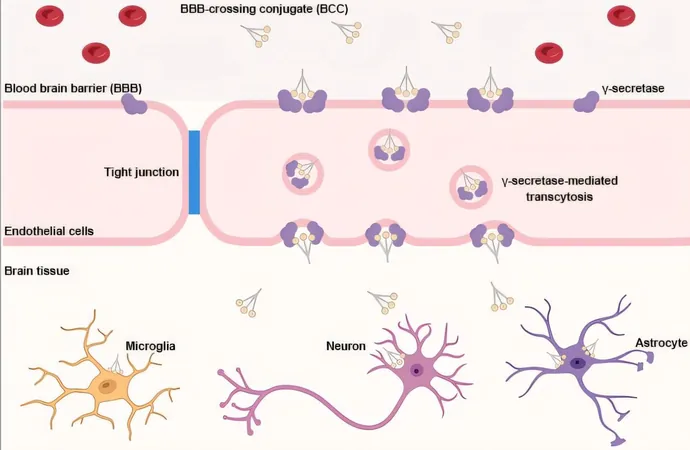
Breakthrough Study Unveils Revolutionary Method to Overcome Blood-Brain Barrier: A New Hope for Brain Disease Treatments!
2024-11-25
Author: John Tan
Exciting Advancement in Neurological Science
Researchers at the prestigious Icahn School of Medicine at Mount Sinai have unveiled a groundbreaking approach that could transform how we treat brain and nerve diseases. This innovative method, tested on mouse models and isolated human brain tissue, introduces a reliable and efficient way to deliver therapeutics directly into the brain, potentially revolutionizing the treatment landscape for numerous neurological and psychiatric disorders.
Pioneering Blood-Brain Barrier-Crossing Conjugate (BCC) System
Published in the November 25 issue of Nature Biotechnology, the study reveals a pioneering blood-brain barrier-crossing conjugate (BCC) system, meticulously designed to navigate the formidable protective barrier that typically hinders large biomolecules from entering the central nervous system (CNS). Titled "Intravenous administration of blood-brain barrier-crossing conjugates facilitate biomacromolecule transport into central nervous system," the research offers a glimmer of hope for conditions like amyotrophic lateral sclerosis (ALS), Alzheimer’s disease, addiction, and beyond.
The Importance of the Blood-Brain Barrier
The blood-brain barrier serves as a crucial defense mechanism, safeguarding our brains against harmful substances while also inadvertently obstructing essential life-saving medications. This protective shield has long posed significant challenges for researchers striving to deliver therapeutic agents that could alleviate debilitating brain disorders.
Innovative BCC Platform
The BCC platform capitalizes on an advanced biological process known as γ-secretase-mediated transcytosis. This unique mechanism allows large therapeutic molecules, such as oligonucleotides and proteins, to be ushered into the brain via simple intravenous injections.
Advancements in Delivery Mechanism
This leap forward is particularly remarkable as it allows biomacromolecules to bypass the blood-brain barrier safely and efficiently—a feat that has long eluded scientists.
Expert Insights from Dr. Yizhou Dong
Dr. Yizhou Dong, a co-corresponding senior author of the study, stated, "The blood-brain barrier is an essential defense mechanism, but it also presents a significant challenge for delivering drugs to the brain. Our BCC platform breaks this barrier, allowing biomacromolecules, including oligonucleotides, to reach the CNS safely and efficiently."
Demonstration with BCC10
In a striking demonstration, researchers utilized a compound called BCC10, linked with innovative genetic tools known as antisense oligonucleotides, which were injected into mice. The results were astonishing, showing a significant decrease in harmful gene activity within the brain.
Focus on ALS and Alzheimer’s
In a transgenic mouse model of ALS, the BCC10 treatment effectively lowered levels of the disease-causing gene Sod1, along with its associated protein. Furthermore, the linked antisense oligonucleotides drastically reduced another gene, Mapt, which is implicated in Alzheimer’s disease and other forms of dementia.
Remarkable Efficacy of BCC10
BCC10 has consistently shown its remarkable efficacy in transporting genetic tools into the brain, enhancing their capability to silence harmful genes across various models, including human brain tissue samples studied in lab conditions. Critically, this treatment was well-tolerated with minimal to no adverse effects on the major organs of the test subjects.
Continuing Research and Future Prospects
Despite advancements, the struggle to breach the blood-brain barrier remains a vital area of research. There is an urgent need for innovative technologies that facilitate the effective delivery of biomacromolecule-based therapies to the central nervous system via systemic administration.
Quotes from Eric J. Nestler
Eric J. Nestler, MD, Ph.D., another co-corresponding senior author, remarked, "Our platform could potentially solve one of the biggest hurdles in brain research—getting large therapeutic molecules past the blood-brain barrier safely and efficiently. This development has the potential to advance treatments for a broad range of brain diseases."
Looking Ahead
As this thrilling research unfolds, the team is preparing for further studies in larger animal models to validate the BCC platform and tap into its full therapeutic potential. The future of treating brain diseases is on the horizon, paving the way for groundbreaking therapies that could change lives forever!




 Brasil (PT)
Brasil (PT)
 Canada (EN)
Canada (EN)
 Chile (ES)
Chile (ES)
 España (ES)
España (ES)
 France (FR)
France (FR)
 Hong Kong (EN)
Hong Kong (EN)
 Italia (IT)
Italia (IT)
 日本 (JA)
日本 (JA)
 Magyarország (HU)
Magyarország (HU)
 Norge (NO)
Norge (NO)
 Polska (PL)
Polska (PL)
 Schweiz (DE)
Schweiz (DE)
 Singapore (EN)
Singapore (EN)
 Sverige (SV)
Sverige (SV)
 Suomi (FI)
Suomi (FI)
 Türkiye (TR)
Türkiye (TR)